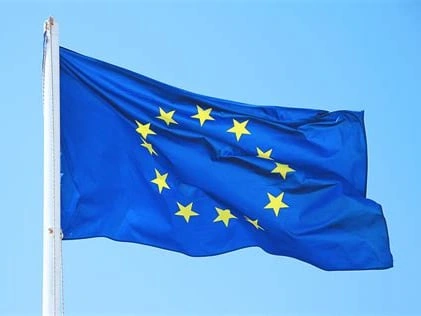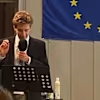EYP's resolution on Afghanistan
This is a proposal of resolution regarding Afghanistan that I submitted with some colleagues in the European Youth Parliament

Youth
Parliament,
In light of the recent events surrounding the withdrawal of the United
States of America from Afghanistan, what strategy should the
European Union adopt with regards to a common foreign and security
policy while also attempting to prevent the next humanitarian
crisis?
Submitted
by: Leonardo Specchiulli, Carolina Cernusco, Jacopo Mattia Gandolfo,
Margherita Maiandi, Matteo Canarutto Gatti, Barbara Mattea
The
European
A.
Deeply concerned about the future of Afghan refugees under the
Taliban regime and alarmed by Afghanistan’s growing humanitarian
crisis,
B.
Noting with concern the increasing number of displaced persons and
people under the poverty line1,
C.
Aware that the humanitarian crisis, derived from the massive exodus
of refugees from Afghanistan, will inevitably reach the European
Union,
D.
Bearing in mind the importance of the Regulation (EU) No 604/2013 of
the European Parliament and of the Council 26 June 2013 establishing
the criteria for the welcoming of migrants in MSs, and of the Council
Directive 2001/55/EC, 20 July 2001 establishing the standards for
protection of migrants, and the current discrepancies in the
migration politics among the Member States,
E.
Observing article 215 of the Treaty on the Functioning of the
European Union (TFEU), which establishes the legitimacy of
interrupting or diminishing economic relations with one or more EU
countries that do not comply with the measures made to achieve the
objectives of the Common Foreign and Security Policy (CFSP),
F.
Keeping in mind the spreading of Covid-19 and the restrictions in
human mobility derived from it,
G.
Appreciating the donation of 200 million Covid-19 vaccines by the EU
to developing countries by the end of 2022, as stated by the
Commission President Ursula Von der Leyen,
H.
Considering that 75% of Afghanistan’s public expenditure comes from
foreign donors,
I.
Acknowledging that the illegal economy impaires and overcomes
international aids and that trafficking in opium, hashish,
methamphetamines and other narcotics is not the main source of
illegal income, because the actual income comes from the illegal
movement of ordinary goods, such as fuel and consumer imports,
L.
Recognizing that the humanitarian aid currently made available by the
EU is not sufficient2,
and aware of the restrictive measures established by Regulation n.
753/2011, especially the fifth article, which allows the release of
certain frozen funds or economic resources for the basic expenses
of sanctioned persons,
M.
Noting with regret that the Taliban have denied civil rights to the
population by:
i)
prohibiting or limiting women to access education,
ii)
dismantling Afghanistan’s educational system installed during the
United States’ presence, and not recognizing the degrees obtained
during that period,
iii)
limiting freedom of the press, of thought and expression3,
N.
Appreciating the intention of building a trans-Afghan railroad
connecting Afghanistan, Pakistan and Uzbekistan and the
Turkmenistan-Afghanistan-Pakistan-India (TAPI) pipeline, but
considering the dramatic lack of infrastructures and services, such
as:
i)
hospitals, that are often without adequate supplies of medicines,
ii)
road networks for communication, trade and business,
iii)
access to the Internet, limited by the Taliban,
O.
Aware that the EU is a relevant member of the United Nations (UN) and
is the only UN observer that can intervene during the United Nations
General Assembly4;
1.
Encourages the European Commission to financially help Afghanistan's
bordering countries, such as Tajikistan and Uzbekistan, in order to
help refugees and prevent massive migrations as happened in 2016 from
Syria5;
2.
Suggests that the European Commission provides the first EU Member
States reached by the refugees with special funds, to face the
emergency expenditure for their reception;
3.
Warmly recommends the European Council to organize the distribution
of the refugees that will arrive in the EU, in proportional measure
among the MSs according to each State’s population, territory and
economic situation, and sanction States who are not willing to
cooperate, with particular attention to the fact that:
a)
each Member State must guarantee security and should not deportee
Afghanistan's people who are searching for protection,
b)
no government can separate family members,
c)
children are particularly vulnerable and must be protected;
4.
Encourages the European Commission to allocate funds, to provide
necessary goods and organize training courses to support the
voluntary work of local organizations that assist the refugees in the
MS territories where they are redistributed;
5.
Urges the European Commission to allocate funds and dispatch
qualified personnel to support reception and accommodation centres
administered by the local, regional and national authorities of the
Member States where refugees are redistributed;
6.
Calls for the European Commission to cooperate with the World Health
Organization (WHO) in order to set up a plan to prevent the spreading
of Covid-19 during and after the redistribution of the refugees,
which should include, but not be limited to:
7.
Invites the European Commission to donate the necessary doses of the
Covid-19 vaccine for those who have not received it yet by creating
agreements with the pharmaceutical companies and with the Talibans;
8.
Encourages the European External Action Service (EEAS) to keep on
establishing diplomatic relations with the Talibans6,
without for the moment recognising their government, while:
9.
Urges MS to discuss a common price to pay for the purchase of opium
for medical purposes from Afghanistan so that it is more advantageous
for the Taliban to sell it to the EU instead of using it for illegal
drug trade;
10.
Urges the European Commission to encourage and economically support
Non-Governmental Organizations (NGOs) which can provide the necessary
support for the Afghan population in terms of food, medicines and
medical treatments, payments for rent or mortgages, insurance
premiums and public utility charges;
11.
Invites the European Commission to cooperate with the Food and
Agriculture Organization (FAO) and the International Labour
Organization (ILO) to set up a plan for the promotion of subsistence
agriculture in Afghanistan, which should include:
12.
Calls the European Commission for the funding of schools and
hospitals in Afghanistan, by collaborating with both local and
international institutions such as the World Bank and UNICEF, in
order to make these services accessible to everyone, regardless of
their gender;
13.
Recommends the European Commission to help the Afghan government to
fix the disastrous infrastructures' situation by sending engineers
and useful materials to help reconstruct roads, hospitals and
schools;
14.
Asks to the Council of the European Union, as an important actor
during this humanitarian crisis, to the High Representative of the
Union for Foreign Affairs and Security Policy, and to the Delegation
of the European Union to the United Nations to present programs and
ask for funds during the next General Assembly of the UN, in order,
but not limited, to:
1https://www.economist.com/leaders/2021/11/13/the-world-must-act-now-to-stop-afghans-starving,
23 million out of 38 face acute hunger. 8.7 million are in a state
of emergency. The UN reckons that by summer 2022 all but 3% of the
Afghans will be under the poverty line.
21
billion €; Euronews 12/10/2021
Like this project
Posted Jul 12, 2022
This is a proposal of resolution regarding Afghanistan that I submitted with some colleagues in the European Youth Parliament
Likes
0
Views
33






